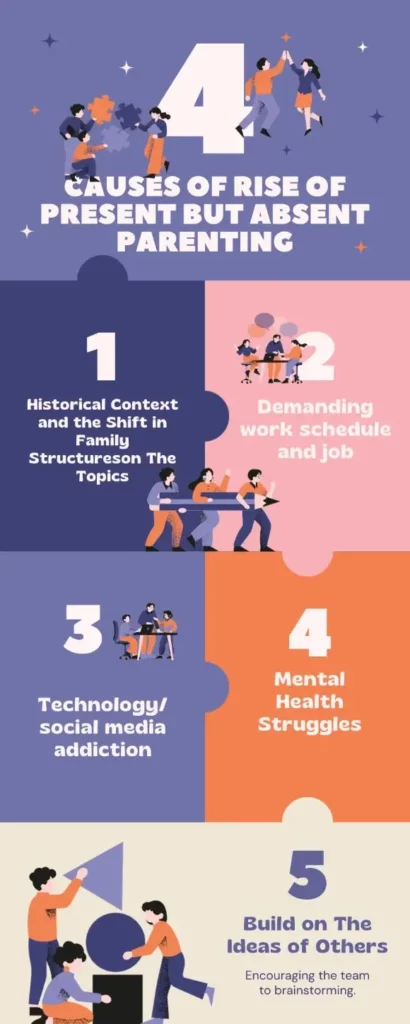Present but absent parenting is a growing issue in modern families. This type of parenting refers to when a parent is physically present with their child but is emotionally unavailable or distracted. The rise of factors like work demands, technology addiction, and mental health struggles have led more parents to be in the same room as their children yet not fully tuned in to their needs.
I understand you are looking for guidance on the complex issue of present but absent parenting. This is a challenging situation, and I commend you for seeking out resources to become a more attuned parent.

Consistency is key when it comes to repairing bonds with your child. Keep making those small moments together count through attentive listening, warmth, and empathy. It may feel hard, but every interaction is an opportunity.
In this comprehensive guide, we will explore what present but absent parenting looks like day-to-day, the common causes, and most importantly, the effects it can have on children when their emotional needs go unmet.
With time and effort, you can become a source of comfort and security. Stay hopeful – small steps in the right direction can lead to lasting change. Keep learning and asking questions. You’ve got this, and things will continue getting better.
What is Present but Absent Parenting?
Present but absent parenting is formally defined as being physically present with your child but emotionally unavailable or aloof to their needs.
A present but absent parent may be in the same room as their child yet is preoccupied with other things like work, devices, or their hobbies and interests. This results in a need for more quality one-on-one interactions and emotional bonding.
While a present but absent parent provides for the child’s basic physical needs, they are not attuned to the child on an emotional level. There is little meaningful conversation, joint activity, or displays of affection.
The parent has difficulty truly seeing the child for who they are and connecting with them. This takes an emotional toll on the child over time.
Signs of Present but Absent Parenting
There are various signs that a parent is physically present but emotionally absent or distracted:
- Not fully engaged or attentive even when physically with the child. They may seem disinterested in interacting.
- More focus on distracting the child with TV, toys, food, etc. rather than having meaningful conversations and connections.
- The child’s emotional needs are often unmet, such as needs for attention, affection, and guidance.
- Lack of parental attentiveness and attunement to the child’s moods, feelings, and goals.
- Children frequently act out, have tantrums, or withdraw/isolate themselves to get attention.
- The parent is preoccupied with work, devices, or their problems and cannot provide emotional support.
- Days go by without any real quality time together. Activities feel detached rather than bonded.
Catching the signs early and making adjustments can help prevent damage to the parent-child relationship.

10 Causes of Rise of Present But Absent Parenting
In today’s fast-paced world, the concept of parenting has undergone a significant transformation. While parents have always played a vital role in the upbringing of their children, there is a growing concern about a phenomenon known as “Present But Absent Parenting.”
This term encapsulates a situation where parents are physically present in their children’s lives but emotionally or mentally absent due to various factors.
To understand this phenomenon better, it’s essential to delve into its roots and the forces that have led to its rise.
1. Historical Context and the Shift in Family Structures
To comprehend the rise of present but absent parenting, we must consider the historical context and how changes in family structures have shaped contemporary parenting dynamics.
In the past, extended families were more common, with multiple generations living together.
This allowed for a strong support system in child-rearing, where grandparents, aunts, uncles, and other relatives actively participated in the upbringing of children. Parenting was a shared responsibility within the family unit.
2. Demanding work schedule and job
Another key contributor to present but absent parenting is the demanding nature of modern work schedules and the struggle to strike a balance between career and family life.
Many parents find themselves juggling long working hours, commuting, and additional professional responsibilities. The pressure to excel in their careers can result in limited quality time spent with their children.
3. Technology/social media addiction
One of the most prominent factors contributing to present but absent parenting is the pervasive influence of technology and digital distractions.
In today’s digital age, parents are often preoccupied with their smartphones, tablets, and computers. Constant connectivity through social media, email, and messaging apps has created a culture of distraction.
4. Mental Health Struggles
Mental health issues, such as depression, anxiety, or unresolved trauma, can significantly affect a parent’s ability to engage fully with their children. These struggles can lead to emotional detachment, mood swings, or erratic behavior, making it challenging to provide consistent emotional support and presence for their children.
5. Marital Problems or Divorce
Marital conflicts or divorce can create an emotionally turbulent environment within the family. Parents preoccupied with their relationship issues may become emotionally distant from their children. They might also struggle with co-parenting responsibilities, leading to inconsistent presence and support for their kids.
6. Substance Abuse
Substance abuse, including alcohol or drug addiction, can severely impair a parent’s ability to be emotionally available and responsible.
The pursuit of substances often takes precedence over parenting responsibilities, leading to neglect and emotional unavailability for the child.
7. Emotional Immaturity
Some parents may struggle with emotional immaturity, making it difficult for them to connect with their children on a deeper level.
Their emotional needs and reactions may mirror those of a child, causing a lack of emotional guidance and stability in the parent-child relationship.
8. Own Upbringing and Attachment Style
Parenting behaviors are often influenced by one’s own upbringing and attachment style.
Parents who experienced neglect or inconsistent care during their childhood may unknowingly repeat these patterns with their children, resulting in emotional absence and detachment.
9. Perfectionism
Parents with perfectionist tendencies may set unrealistically high standards for themselves and their children.
While striving for excellence is admirable, the relentless pursuit of perfection can lead to emotional distance as parents focus on achieving external goals rather than nurturing emotional connections.
10. Self-Focus
Excessive self-focus, driven by career ambitions, personal goals, or other pursuits, can divert a parent’s attention away from their children.
When parents prioritize their needs and desires over their children’s emotional well-being, it can result in emotional absence and a sense of neglect in the parent-child relationship.
In many cases, getting to the root causes through self-reflection and professional help can lead to positive change.

9 Effects on Children
Present but absent parenting can leave children with deep emotional wounds and negatively impact their overall development and well-being in various ways:
Certainly, here are the subheadings for the effects of “Present But Absent Parenting,” each with approximately 80 words of explanation:
1. Feelings of Neglect, Loneliness, and Emotional Detachment from Their Parents
Children experiencing present but absent parenting often grapple with profound feelings of neglect, loneliness, and emotional detachment from their parents.
The lack of consistent emotional connection can lead to a sense of abandonment and emotional emptiness, which may have lasting consequences on their overall well-being.
2. Acting Out Through Attention-Seeking Behaviors
To fill the emotional void left by absent parents, children may resort to attention-seeking behaviors.
These actions can manifest as disruptive behavior, seeking negative attention, or engaging in risky activities in a desperate attempt to gain their parents’ notice and affection.
3. Emotional Problems Like Anxiety
The emotional instability caused by present but absent parenting can lead to heightened anxiety in children.
Constantly wondering about their parents’ availability and emotional state can create a sense of uncertainty and fear, contributing to the development of anxiety disorders.
4. Difficulty Regulating Emotions and Behavior
Children may struggle with regulating their emotions and behavior when faced with inconsistent parental support.
The absence of a stable emotional anchor can result in mood swings, impulsivity, and difficulty coping with stressors, affecting their overall emotional well-being.
5. Poor Social Skills
Present but absent parenting can hinder the development of essential social skills.
Children may struggle to form healthy relationships, communicate effectively, or empathize with others due to the lack of positive emotional modeling and guidance from their parents.
6. Low Self-Worth and Lack of Identity Development
A lack of emotional support and guidance can contribute to low self-esteem and children’s diminished sense of self-worth.
They may also face challenges in developing a clear sense of identity and self-confidence, which are crucial aspects of healthy emotional development.
7. Decline in Academic Performance
The emotional turmoil resulting from present but absent parenting can have a detrimental impact on a child’s academic performance.
The inability to concentrate, persistent stress, and feelings of inadequacy may lead to a decline in school performance and reduced motivation to excel academically.
8. Physical Symptoms
The emotional stress caused by absent parenting can manifest in physical symptoms such as headaches, stomachaches, and sleep disturbances. These physical manifestations of emotional distress highlight the interconnectedness of physical and emotional health.
9. Developmental Delays
Children experiencing present but absent parenting may face developmental delays, both socially and emotionally.
The lack of consistent emotional support and guidance can hinder their progress in reaching developmental milestones, potentially impacting their long-term growth and well-being.
These effects underscore the profound impact that present but absent parenting can have on a child’s emotional, social, and cognitive development.
Recognizing these consequences is essential for parents, caregivers, and professionals working to support children facing these challenges. The emotional trauma of present but absent parenting can leave scars well into adulthood if not addressed early on.

9 Long Term Effects
The impact of present but absent parenting often persists into adulthood. Some potential long-term effects include:
1. Attachment Disorders
Children who experience present but absent parenting may develop attachment disorders that persist into adulthood. These disorders can lead to difficulties in forming and maintaining healthy relationships.
They may struggle with issues of trust, intimacy, and emotional closeness, which can impact their personal and romantic relationships.
2. Lack of Empathy
Growing up with emotionally absent parents can lead to a lack of empathy in adulthood.
These individuals may have difficulty understanding and connecting with the emotions of others, which can strain their relationships and limit their ability to provide emotional support to loved ones.
3. Mental Health Issues
The long-term effects of present but absent parenting can include an increased risk of mental health issues such as depression, anxiety, and personality disorders.
The emotional scars from childhood can persist, affecting a person’s emotional well-being throughout their life.
4. Trouble Being Attentive
Adults who experience absent parenting may struggle with being attentive and emotionally present in their own relationships and parenting roles.
The patterns of emotional absence from their childhood can perpetuate in their families, creating a cycle of emotional detachment.
5. Impulsiveness and Risk-Taking Behaviors
A lack of emotional stability and guidance during childhood can contribute to impulsive and risk-taking behaviors in adulthood.
Individuals may seek out risky experiences or engage in impulsive decision-making as a way to cope with their emotional pain or to fill the emotional void left by absent parents.
6. People-Pleasing Tendencies
Some individuals raised by absent parents may develop people-pleasing tendencies as they seek external validation and approval to compensate for the emotional neglect they experienced.
This can lead to difficulties in setting healthy boundaries and asserting their own needs.
7. Underdeveloped Sense of Self
A lack of emotional support and guidance can result in an underdeveloped sense of self.
Adults who experience absent parenting may struggle to define their own identities and have a limited understanding of their values, beliefs, and aspirations.
8. Cognitive Distortions
Emotional neglect during childhood can contribute to the development of cognitive distortions, where individuals have skewed perceptions of themselves and the world around them.
These distortions can lead to negative self-talk, self-doubt, and persistent feelings of inadequacy.
9. Anger, Grief, and Bitterness
Many adults who grew up with absent parents may carry deep-seated feelings of anger, grief, and bitterness.
These emotions can stem from the unmet emotional needs of childhood and can have a significant impact on their overall emotional well-being and life satisfaction.
Recognizing these long-term effects is crucial for individuals who have experienced present but absent parenting and may require therapeutic intervention to address the emotional wounds and develop healthier emotional patterns in adulthood.

7 Ways to Repair the Damages Through Present But Absent Parenting
If you recognize yourself in the present but absent parent description, here are some tips to start repairing the damage:
1. Self-Awareness
Self-awareness is the first step towards improving your presence as a parent. Take time to reflect on your emotional state, stressors, and distractions.
Acknowledge when you may be emotionally distant from your child. By understanding your emotional triggers, you can better manage them and be more present for your child.
2. Establish Eye Contact and Get Together
Eye contact is a powerful tool for building emotional connections. Make an effort to maintain eye contact when talking to your child.
Additionally, physically get down to their level—kneel or sit—to create a sense of closeness and equality. These simple actions can convey that you are fully engaged and present in the moment with them.
3. Regular Dedicated One-on-One Time
Allocate regular, dedicated one-on-one time with your child. Quality matters more than quantity. During this time, focus solely on your child’s interests and needs.
Put away distractions, such as phones and laptops, and engage in activities that promote bonding and meaningful conversations.
4. Reflect When Someone Shares
When your child shares their thoughts, feelings, or experiences, practice active listening. Reflect on what they’ve shared to show that you’re genuinely engaged and interested.
This not only validates their emotions but also encourages open communication and trust.
5. Get Professional Counseling or Therapy
If you find it challenging to overcome emotional distance, consider seeking professional counseling or therapy.
A trained therapist can help you explore the underlying causes of your emotional absence and provide guidance on building stronger emotional connections with your child.
6. Consider Family Therapy
Family therapy can be beneficial for both you and your child. It provides a safe space for open communication and allows family members to address issues collectively.
A skilled family therapist can help identify and address patterns of emotional absence and facilitate healthier interactions within the family.
7. Commit to Being the Loving
Commitment is key. Make a conscious decision to be a loving and emotionally present parent.
Set goals and remind yourself daily of your commitment to building a strong parent-child relationship. This dedication can serve as a powerful motivator for change and improvement.
By implementing these tips, you can minimize the damages associated with present but absent parenting and work toward fostering a more emotionally connected and supportive relationship with your child.
Remember that change takes time and effort, but the rewards of a closer parent-child bond are well worth it.
It’s never too late to become more emotionally available and repair attachment wounds. Your relationship can still thrive.

The Role of Government and Employers
In the complex landscape of present but absent parenting, the role of government and employers cannot be overstated.
These entities play a pivotal role in shaping the work environment and policies that either facilitate or hinder parents’ ability to balance their professional responsibilities with their roles as caregivers.
In this section, we explore the critical areas where governments and employers can make a positive impact.
1. Parental Leave Policies
One of the most influential ways governments can support present but absent parents is by enacting comprehensive parental leave policies.
Paid parental leave not only allows parents to bond with their children during the crucial early months but also eases the financial burden associated with taking time off work.
Longer and more flexible leave options ensure that parents can be physically and emotionally present for their children’s formative years without compromising their economic stability.
2. Flexible Work Arrangements
Employers can contribute significantly by offering flexible work arrangements. This includes options such as telecommuting, flexible hours, job-sharing, and compressed workweeks.
These arrangements empower parents to tailor their work schedules to their family needs, making it easier to balance work and parenting responsibilities.
Employers who prioritize flexibility also tend to have more engaged and motivated employees, ultimately benefiting the company’s productivity and retention rates.
3. Promoting Family-Friendly Workplaces
Creating family-friendly workplaces is essential to addressing present but absent parenting. Employers can implement policies that support work-life balance, such as on-site childcare facilities, lactation rooms, and wellness programs.
Fostering a culture that values family time and prioritizes employee well-being contributes to a healthier work environment and more satisfied employees.
Thus, governments and employers have a crucial role to play in mitigating the challenges of present but absent parenting.
Parental leave policies, flexible work arrangements, and family-friendly workplaces can collectively create a more supportive environment for parents.
By recognizing the importance of both career and family, we can take significant steps towards reducing the prevalence of present but absent parenting and promoting healthier family dynamics.
Balancing Act of Present But Absent Parenting Through Challenges and Success Stories
In the intricate dance of present but absent parenting, numerous parents find themselves navigating the delicate balance between their professional lives and their responsibilities as caregivers.
This section delves into real-life stories, common challenges, and inspiring success stories, shedding light on the complexities of this balancing act.
1. Real-Life Stories of Parents Striving to Balance Both Roles
Many parents face the daily challenge of juggling demanding careers and parenting responsibilities. Take the example of Sarah, a marketing executive and mother of two young children.
Sarah often finds herself torn between meeting project deadlines and attending her children’s school events. She acknowledges the difficulty of being fully present for her kids while trying to excel in her career.
Despite the struggles, she is committed to finding ways to engage with her children, even during her busiest workdays.
Similarly, David, a single father, shares his experiences of adapting to the role of both breadwinner and primary caregiver after his divorce.
He emphasizes the importance of maintaining a strong emotional connection with his children, even when his work schedule is demanding.
2. Common Challenges and Obstacles Faced
While the stories of parents like Sarah and David inspire us, they also highlight the common challenges faced by those trying to balance these dual roles.
Time constraints often lead to missed family moments, such as school activities or bedtime routines. Guilt frequently gnaws at parents who feel they aren’t dedicating enough quality time to their children.
The pressure to excel at work while providing emotional support at home can take a toll on mental and physical well-being. Burnout, stress, and feelings of inadequacy are recurring challenges that parents confront.
Additionally, navigating societal expectations and often unrealistic standards adds an extra layer of complexity to this balancing act.
3. Inspiring Success Stories and Lessons Learned
Despite the hurdles, there are inspiring success stories that offer valuable lessons. Parents who have managed to strike a harmonious balance emphasize the importance of setting priorities and boundaries.
They encourage open communication with employers about their family needs and strive to make the most of available resources, such as parental leave and flexible work arrangements.
One success story comes from Lisa, a project manager and mother of three.
She learned to delegate tasks at work and involve her children in age-appropriate chores, teaching them valuable life skills while lightening her load.
By fostering resilience and adaptability in her children, Lisa believes she is preparing them for their future roles as balanced parents.
So, the challenge of balancing the demands of work and parenthood is a universal experience for many parents.
While the obstacles are real, there are inspiring success stories that remind us of the resilience and determination of parents striving to be present in their children’s lives.
Their stories teach us that, with dedication, support, and strategic planning, it is possible to find equilibrium in the delicate balancing act of present but engaged parenting.

Bridging the Gap In Co-Parenting and Support Systems
In the journey of present but absent parenting, bridging the gap between work and family life is essential for maintaining a healthy and supportive environment for children.
Here, I will explore the significance of co-parenting, extended family and community support, and the importance of building a robust support network.
1. The Importance of Co-Parenting and Shared Responsibilities
Co-parenting is a fundamental aspect of present but engaged parenting. Whether parents are together or separated, sharing responsibilities for the physical, emotional, and intellectual development of their children is paramount.
Effective co-parenting involves clear communication, shared decision-making, and consistency in parenting approaches.
When parents work together as a team, they can ensure a stable and nurturing environment for their children, even in the face of busy schedules and demanding careers.
2. Utilizing Extended Family and Community Support
Extended family and community support play a vital role in minimizing the challenges of present but absent parenting. Grandparents, aunts, uncles, and close family friends can provide valuable assistance and emotional support. They can step in to fill gaps when parents face work-related commitments.
Additionally, involvement in community activities and organizations can connect parents with like-minded individuals who can offer guidance, advice, and practical assistance when needed.
3. Building a Strong Support Network
Parents navigating the delicate balance of work and family life benefit from building a strong support network. This network can include friends, colleagues, and fellow parents who understand the challenges and can provide empathy and advice.
Online and offline parenting groups, local community organizations, and support networks offered by employers can be invaluable resources for parents seeking camaraderie, practical tips, and a sense of belonging in their journey to be present parents.
Thus, bridging the gap between present and absent parenting and ensuring a nurturing environment for children requires a concerted effort from parents, extended family members, and the community.
Final Verdict on Present but Absent Parenting
Present but absent parenting can leave deep emotional wounds in children that persist well into adulthood. However, by becoming aware of the causes and effects of this detached style of parenting, steps can be taken to heal and strengthen the parent-child relationship.
It is always possible to become more present and tuned as a parent. Making your child feel truly seen, heard, and emotionally connected with you will go a long way in repairing attachment and building their sense of self-worth. With patience and professional support, the damage can be reversed.
Common causes include work demands, technology/device addiction, mental health struggles like depression, marital conflict, financial stress, emotional immaturity, perfectionism, and repeating unhealthy patterns from one’s upbringing.
Long-term effects can include attachment disorders, relationship struggles, lack of empathy, mental health issues, trouble being an attentive parent themselves, an underdeveloped sense of self, and anger/grief over the lack of support.
Signs include lack of attentiveness/engagement, overuse of TV/devices instead of interaction, child’s emotional needs going unmet, child acting out for attention, and lack of quality time together.
Tips include:
- Increased self-awareness.
- Putting devices down when with kids.
- Dedicated one-on-one time.
- Active listening.
- Validating feelings.
- Expressing affection regularly.
- Getting professional help if needed.



